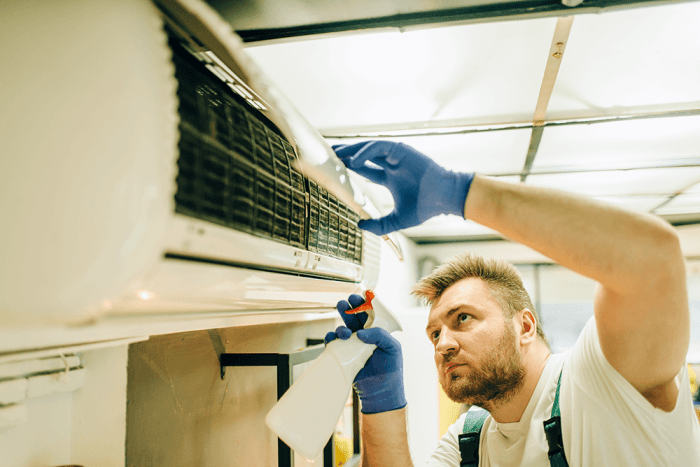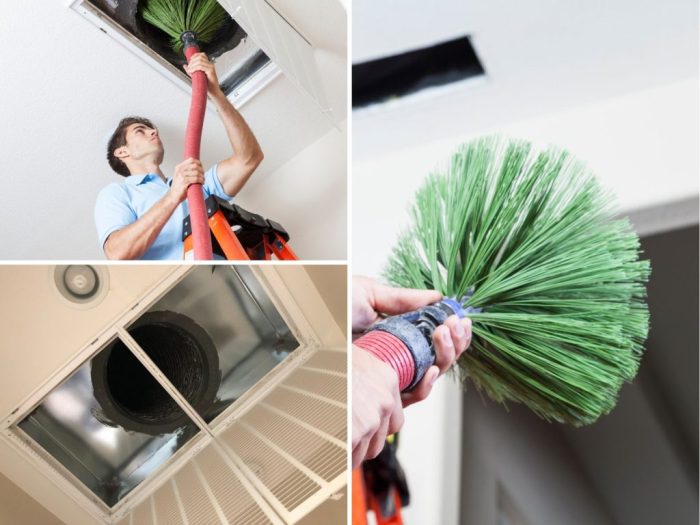Delving into the realm of HVAC cleaning services, one uncovers a crucial aspect of maintaining a healthy living environment. From reducing contaminants to optimizing energy efficiency, the significance of regular HVAC cleaning cannot be overstated.
As we explore the intricacies of HVAC cleaning, we unveil a world where clean ducts, coils, and filters play a pivotal role in ensuring not just comfort but also well-being.
Importance of HVAC Cleaning Services
Regular HVAC cleaning is crucial for maintaining good indoor air quality. Over time, dust, dirt, and other contaminants can accumulate in the HVAC system, circulating throughout the home or building and affecting the health of occupants.
Impact on Health and Energy Efficiency
Dirty HVAC systems can have a significant impact on health and energy efficiency. Here are some examples:
- Poor indoor air quality can lead to respiratory issues, allergies, and other health problems.
- Build-up of dust and debris in the HVAC system can restrict airflow, causing the system to work harder and consume more energy.
- Dirty coils and filters can reduce the efficiency of the HVAC system, leading to higher energy bills.
Benefits of Professional HVAC Cleaning Services
Professional HVAC cleaning services offer several advantages over DIY methods:
- Experts have the knowledge and tools to thoroughly clean all components of the HVAC system, ensuring optimal performance.
- Professional cleaning can help extend the lifespan of the HVAC system, reducing the need for costly repairs or replacements.
- By investing in professional cleaning, you can enjoy improved indoor air quality and a more energy-efficient HVAC system.
Process of HVAC Cleaning

Regular HVAC cleaning is essential to maintain air quality and system efficiency. Here is an overview of the steps involved in a thorough HVAC cleaning service:
Duct Cleaning
Duct cleaning involves removing dust, debris, and other contaminants from the ductwork to improve airflow and indoor air quality.
- Inspection of ductwork for any visible dirt or debris.
- Use of high-powered vacuum equipment to remove dust and debris from the ducts.
- Application of antimicrobial treatments to prevent mold and bacteria growth.
Coil Cleaning
Cleaning the coils is crucial for maintaining the efficiency of the HVAC system.
- Inspection of the coils for dirt and debris buildup.
- Use of coil cleaning solutions and brushes to remove dirt and grime.
- Rinsing the coils thoroughly to ensure proper cleaning.
Filter Replacement
Regular filter replacement is necessary to ensure proper airflow and prevent system breakdowns.
- Removal of the old filter and disposal.
- Selection of the appropriate filter size and type for the HVAC system.
- Installation of the new filter to improve air quality and system efficiency.
Common Contaminants in HVAC Systems

Indoor air quality can be significantly impacted by various contaminants that accumulate in HVAC systems. These contaminants not only affect the efficiency of the system but can also pose health risks to occupants. Professional cleaning services play a crucial role in addressing these contaminants to ensure clean and healthy indoor air.
Mold
Mold growth is a common issue in HVAC systems, especially in damp and dark areas. Mold spores can spread through the air ducts and circulate throughout the indoor space, leading to respiratory issues and allergies. Professional cleaning services utilize specialized equipment and techniques to remove mold and prevent its regrowth.
Dust
Dust particles can accumulate in HVAC systems over time, reducing airflow and causing the system to work harder. This can result in increased energy consumption and decreased efficiency. Professional cleaning services clean and remove dust buildup from the ducts, filters, and other components to improve system performance.
Bacteria
Bacteria can thrive in moist environments within HVAC systems, leading to unpleasant odors and potential health hazards. Professional cleaning services use antimicrobial treatments to eliminate bacteria and prevent their growth, ensuring a clean and hygienic indoor environment.
Frequency and Timing of HVAC Cleaning
Regular HVAC cleaning is essential for maintaining indoor air quality and the efficiency of the system. The frequency of cleaning can vary depending on various factors.
Recommended Frequency for HVAC Cleaning
In general, it is recommended to have residential HVAC systems cleaned at least once a year. However, for commercial settings or high-traffic areas, more frequent cleaning may be necessary, such as every 3 to 6 months.
Factors Influencing Cleaning Schedule
- Usage: HVAC systems that are used frequently or operate for long hours may require more frequent cleaning.
- Location: Areas with high levels of dust, pollen, or pollution may need more frequent cleaning to prevent buildup in the system.
- Environment: Humid environments can promote the growth of mold and mildew in HVAC systems, requiring more frequent cleaning.
Guidelines for Scheduling HVAC Cleaning
For different types of HVAC systems, the following guidelines can help determine when to schedule cleaning:
- For forced-air systems: Cleaning should be scheduled at least once a year to ensure optimal performance.
- For ductless mini-split systems: Cleaning every 3 to 6 months is recommended to prevent blockages and maintain efficiency.
- For window units: Cleaning every 2 to 3 months can help prevent dust and dirt buildup in the unit.
Ending Remarks
In conclusion, HVAC cleaning services are not just a matter of routine maintenance; they are a cornerstone of a healthy indoor environment. By addressing common contaminants and adhering to recommended cleaning schedules, one can truly reap the benefits of a well-maintained HVAC system.
Frequently Asked Questions
How often should HVAC systems be cleaned?
For residential settings, it's typically recommended to clean HVAC systems every 1-2 years. However, factors like usage and location can influence the frequency.
What are common contaminants found in HVAC systems?
Common contaminants include mold, dust, bacteria, and allergens. These can significantly impact indoor air quality if not addressed through regular cleaning.
Why opt for professional HVAC cleaning services over DIY methods?
Professional services ensure thorough cleaning using specialized tools and expertise. They can effectively target and remove contaminants that DIY methods might miss.
